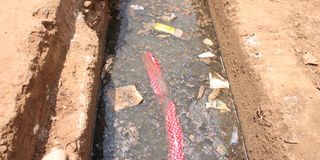Why Kisii town is turning into one huge dumpsite

Stagnant sewage water at Kisii town Central Business District outside Uhuru plaza building on March 22, 2022.
The glory of Kisii town is quickly diminishing and residents are now up in arms over its filthy state.
Just a decade ago, serenity and order intertwined with a versatile and hospitable population characterised the fast-growing urban centre.
But the once clean town adored by nature lovers is no more and has been replaced with heaps of garbage, a powerful stench and raw effluent flowing freely into the streets and water sources. Traders say garbage collectors take too long to empty waste bins, leading to overflow.
The most affected are traders at the Kisii open-air market, where raw sewage runs in open channels.
Other affected places are some buildings near Huduma Centre and Uhuru Plaza where owners discharge sewage to the streets.
“There are some private developers who discharge raw sewage to the streets, something that has affected our business. We raised the concerns three months ago but no action has been taken” said Ms Josephine Momanyi, a trader.
She argued that they display their items next to raw sewage, something that has made them lose customers.
Another source of outrage is the raw sewage spotted in the river Nyakomisaro, which connects to River Riana and Gucha, which in turn drains into Lake Victoria.
Last year, National Environment Management Authority (Nema) officials started a crackdown on buildings that lacked proper sewerage connections in a move to ‘save’ the river, but the campaign stopped sooner after in unclear circumstances.
Busy town
At the time, three high-rise residential buildings in the Menyinkwa and Mwembe areas were shut and tenants ordered to find alternative accommodation.

The glory of Kisii town is quickly diminishing and residents are now up in arms over its filthy state.
The Nyakomisaro river cuts through the busy town and several buildings have been built on the riparian land. The owners are accused of releasing raw sewage into the river.
The road leading to the Daraja Mbili market, where millions of shillings exchange hands each market day, is the most notorious, with bursting sewage lines and manholes.
Daraja Mbili is the second-largest open-air market in the Western region after Kibuye in Kisumu County.
“The effluent flowing along this road ends up in our rivers. We are worried that there is no permanent solution to this problem. We are at risk of contracting cholera” said Ms Ann Kerubo, a fruit vendor.
Accommodation, water connectivity and sewage systems in Kisii town are overstretched because of a growing population.
County Nema officials have been accused of allegedly failing in their oversight role of ensuring the environment is protected.
But county Nema Director Leonard Ofula blamed the Gusii Water and Sanitation Company (Gwasco) for the mess, saying it is the entity responsible for ensuring the problem was fixed.
“I will reach out to Gwasco to find out why the problem has not been handled. It is really bad that locals are residing in such an environment,” Mr Ofula told the Nation by phone.
The same sentiments were expressed by Municipality Manager Nahashon Ongeri, who said his office is not responsible for improving the sewage system.
“Matters to do with the sewage system are purely under Gwasco. We don’t have any role in that,” he noted.
The municipality regulates refuse collection and solid waste management alongside providing water and sanitation services.
In an earlier statement, Gwasco acting managing director Elvis Masiga said his office had noted the complaint and was working to resolve it.





